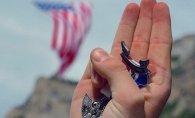Jacob and Nathan Ritter are a formidable duo. The 18-year-old twins maintain 4.0 GPAs at Wayzata High School, play competitive chess, and are part of a weekend hockey league. Autumn found them narrowing their college choices and contemplating career plans — both are strongly considering becoming teachers.
Their accomplishments are even more impressive considering the additional hurdle they face daily: The Plymouth residents, who share many talents and hobbies, also share a diagnosis of limb-girdle muscular dystrophy (LGMD).
LGMD is a genetic disorder that weakens muscles over time, affecting the shoulders and upper arms, as well as muscles around the hips and thighs. The Ritters currently use electric wheelchairs to get around.
The twins’ disease began to affect them when they were in kindergarten. After an illness, they got weaker and started to fall down sometimes, which led to their first wheelchairs. These models were manual and the 6-year-olds couldn’t push themselves, so they abruptly lost their kindergarten-level independence. But before too long, the school “dug out these ancient electric wheelchairs,” Nathan says, and they never went back to the manual chairs.
Even as kindergartners, the Ritters didn’t let muscular dystrophy slow them down. They began playing both chess and piano at age 6. Today they play competitive chess with the U.S. Chess Federation, on a school team, and also in the Twin Cities Chess League. They spent four years teaching chess to elementary-age kids, and though they are taking a break from piano lately, they still play sometimes.
Besides all this, they have another exciting hobby: hockey. In July 2016, Nathan and Jacob played their third tournament with the Minnesota Power Hockey League, an event Jacob says was “really competitive.” The Ritters’ team won each of their last two games—the semifinal and championship games—by just one goal.
Chad Wilson, a team captain the Ritters consider “the best player in [the] league,” says the brothers are both strong players. “It’s almost like the two have some type of twin telepathy. Nathan and Jacob have a truly special connection both on and off the court.”
The Ritters really do finish each other’s sentences and agree on this straightforward suggestion for success: Stay positive and work hard.
Jacob’s longtime role model, Lou Gehrig, helped inspire this mindset. Jacob found Gehrig’s farewell speech so moving that he used to have it memorized. “He was dying [of amyotrophic lateral sclerosis], and he knew it. They had this big appreciation day for him and he said that he still considered himself the luckiest man on earth. He was a very positive guy and a great baseball player.”
That kind of positivity can be essential with a diagnosis like the Ritters’. “It is progressive, and basically the muscles are gradually weakening and dying over time, so we kind of have to plan that out,” Nathan says. Their disorders started progressing more quickly a few years ago, and their previous wheelchair model, they explain, wasn’t quite up to snuff. Their current chairs meet their needs better with a power elevating leg rest, and a function that helps them stand up, which is getting harder. The twins say they will probably lose the ability to walk, but they’re hoping to get through college and get jobs before that happens.
They plan to attend school together, and have been checking to see if schools are as wheelchair-accessible as advertised. While touring the University of Minnesota, they found that some tunnels ended in stairs. But with planning, and their positive attitudes, Jacob and Nathan are both poised to conquer the challenges ahead with confidence and enthusiasm.









